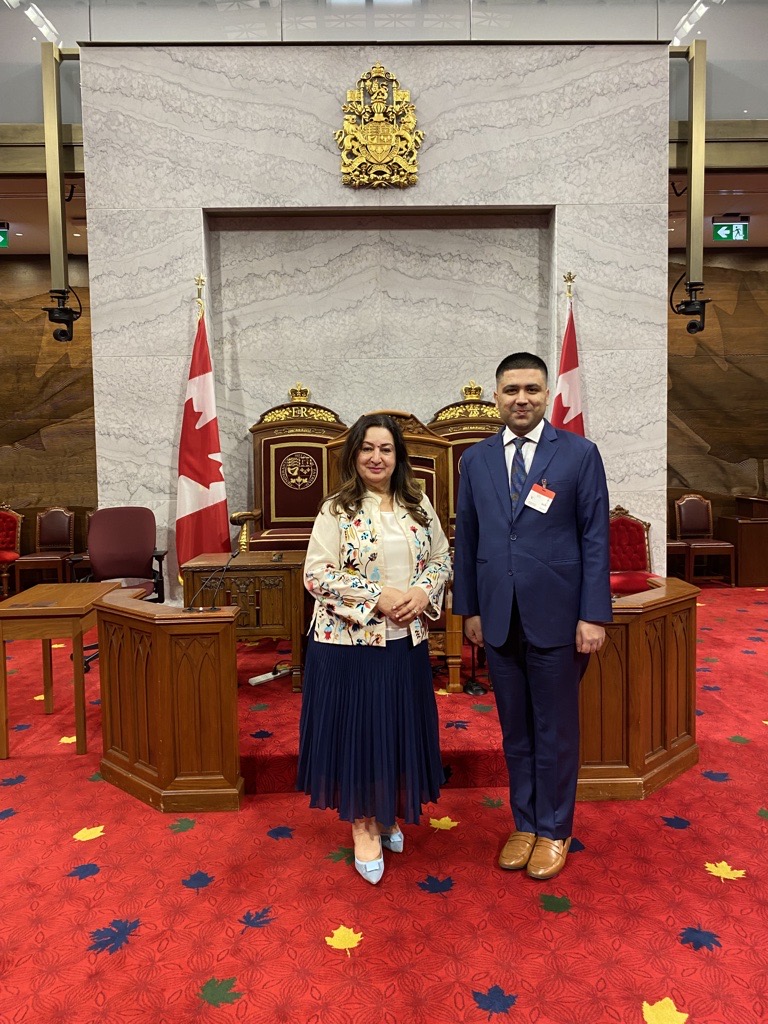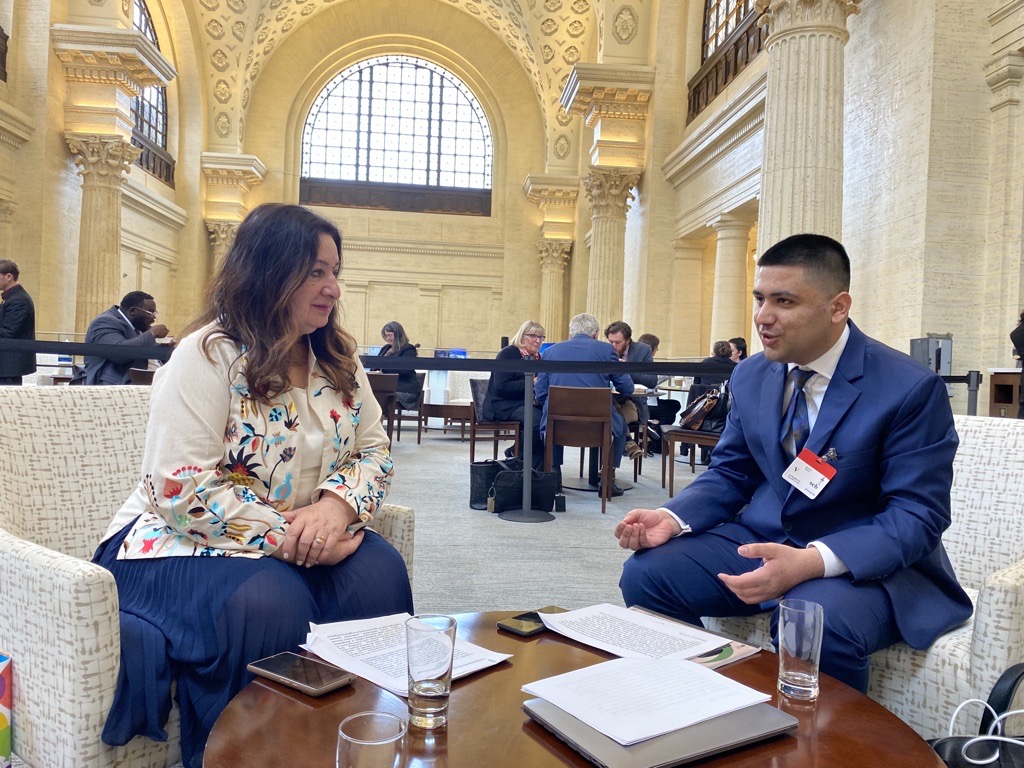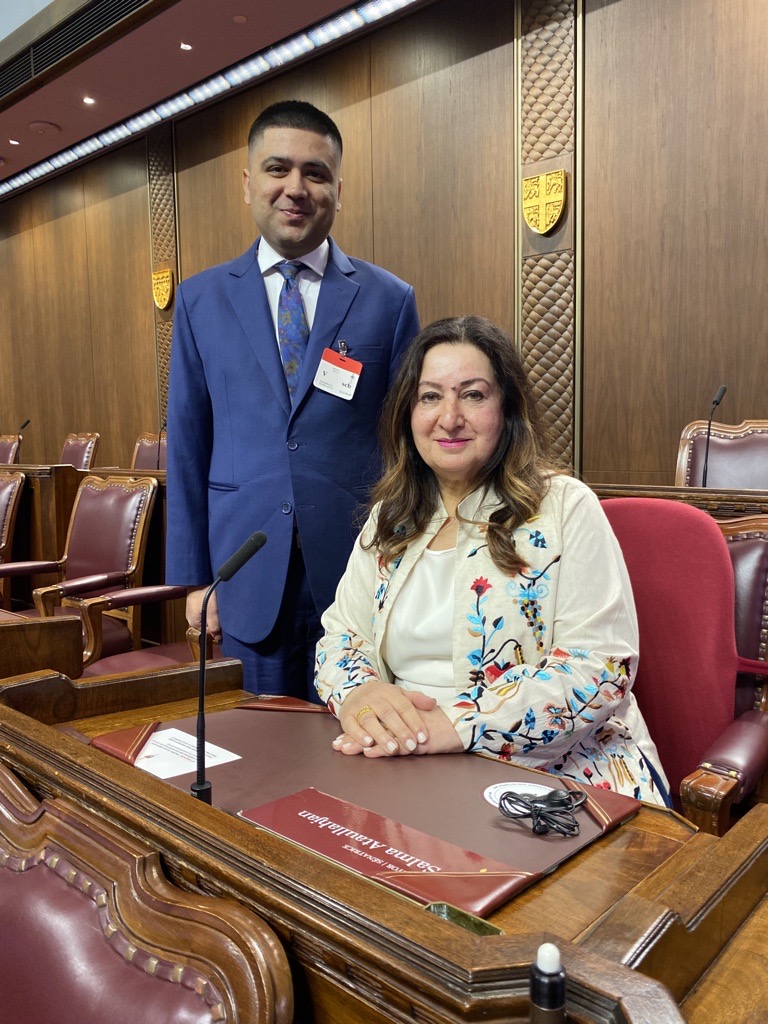‘Hope is a form of victory’: MPP alumnus interviews Canadian Senator and Chair of the Standing Senate Committee on Human Rights
Salma Ataullahjan, the first Canadian Senator of Pakistani origin, is interviewed by Blavatnik School alumnus Shoaib Rizvi reflecting on her motivations and why she won't stop fighting for human rights and women’s empowerment in Canada and across the globe.

Senator, your family heritage connects to Abdul Ghaffar Khan, popularly known as Bacha Khan, a towering figure in South Asian history celebrated for his commitment to nonviolence and his alliance with Mahatma Gandhi, which have left an indelible mark on history. In an interview, you mentioned drawing inspiration from your upbringing, stating, 'Politics is in my blood. It was a part of everyday life while growing up.’ Drawing from your intimate connection to your great-grandfather's principles, could you share a poignant anecdote or reflection that underscores how Bacha Khan’s unwavering commitment to public service has influenced your own trajectory in leadership?
"Bacha Khan" and "Nikka Baba"—he was great granduncle, but we quite often called him “Nikka Baba,” meaning grandfather. Growing up, we saw him quite often, but sometimes we did not see him for long periods because he spent 1 out of 3 days of his life in prison, but as children, we didn't fully grasp his significance then.
What stood out was his simplicity and unwavering commitment to his people. He lived modestly, avoiding excess—a stark contrast to the entitlement often seen in leadership today. As the only leader advocating peaceful agitation against the British, he led marches where Pukhtun faced British retaliation without resorting to violence. This unique approach taught us valuable lessons in effective engagement and the power of peaceful agitation.
At one point he lived in our house in Peshawar, where prominent political leaders visited him. Though we didn't fully appreciate their importance as children, the environment instilled in me the values of compassion, humility, and perseverance.
From "Nikka Baba," I learned the importance of staying true to one's principles and goals, a lesson that has guided me throughout my life and career.
Senator, on the recent sombre anniversary of the Rana Plaza Building collapse in Dhaka, Bangladesh — a tragedy claiming over 1,100 lives and injuring thousands — it is clear that progress has been scant. The pressing question emerges: how can Canadian companies be held accountable to ensure workplace safety and prevent further loss of human lives in garment production?
During a conference in Bangladesh, I requested to visit Rana Plaza after seeing the shocking collapse images. I visited the site of Rana Plaza 3 months after its collapse.
Arriving at Rana Plaza, I was shocked by the devastation and the sight of people whose children's bodies were never found, even three months after the collapse. Amidst rubble and rainwater, I asked about the possibility of recovery, only to be told it was futile. The memory of those families and their lost loved ones haunts me to this day.
The experience deeply affected me. Upon my return, I proposed a study on garment workers' rights to the Standing Senate Committee on Human Rights. We held a session, followed by discussions with Canadian companies, revealing gender disparities and inadequate rights for women garment workers and unsafe conditions.
Companies like Joe Fresh, Loblaws, and Gildan, who appeared before us, sign contracts with local firms in Bangladesh, but these firms in turn often subcontract without oversight, posing a persistent problem.
As a critic of Bill S-211 (an Act to enact the Fighting Against Forced Labour and Child Labour in Supply Chains Act and to amend the Customs Tariff), I acknowledge its complexities, particularly as an opposition member. The bill mandates reporting on supply chain practices to combat forced and child labour. While more action is needed, I believe in initiating the process and iteratively enhancing it. Targeting fashion brands engaged in such practices is crucial, promoting transparency and accountability.
I am inspired by the younger generation’s ethical awareness and commitment to fair treatment of workers. Even my daughters are conscientious consumers, boycotting companies that mistreat their workers. This gives me hope for the future.
In light of the 2017 tragedy at the Great Mosque of Quebec and subsequent violent incidents targeting Muslim communities in Canada, the Standing Senate Committee on Human Rights convened hearings and produced a report titled 'Combatting Hate: Islamophobia and its Impact on Muslims in Canada.' Senator, could you elaborate on the complex intersectional dynamics of Islamophobia, particularly concerning gender?
As Chair of the Standing Senate Committee on Human Rights, I have been deeply involved in combating Islamophobia.
Recognising the importance of this issue, we conducted 21 meetings and heard from 138 official witnesses. However, we spoke to many more individuals in communities across British Columbia, Alberta, Quebec, and Ontario. We visited mosques, schools, and other local settings to gather these insights.
Some of our findings were particularly striking. In Edmonton, for example, young Black Muslim women shared harrowing experiences of regular abuse. We realised there is a gendered aspect to Islamophobia; wearing a hijab is challenging, but being a Black woman in hijab is even harder. These women reported being spat on, having coffee thrown at them, and enduring verbal and physical abuse. Hearing their stories was profoundly moving for all of us on the committee.
In a Mississauga school, a group of 30 students hesitated to share their experiences until one spoke up about hurtful jokes and comments they faced, leading to a flood of revelations. At an event, I highlighted these issues and urged parents to discuss them with their children. A young Sikh mother later shared that her 12-year-old son faced harassment due to his turban, underscoring the broader context of religious discrimination children endure.
We provided 13 recommendations to the government, focusing on education and awareness among teachers, medical professionals, lawyers, and law enforcement agencies. Hate crimes often go unrecognised as such by the police, and this needs to change. For instance, in Quebec City, a mother wearing a hijab was abused in front of her children, and when she insisted on pressing charges, she was charged as well. This highlights the need for better training and awareness among our police forces.
Our study aims to create a more equal and inclusive Canada. Muslims are not newcomers; we have long been part of the fabric of this nation. The mosque in Edmonton, the first in North America, stands as a testament to our long-standing presence and contributions. We choose Canada and are willing to stand up for its values, including giving our lives if necessary. Therefore, we deserve to be treated equally and with respect.

As the rapporteur for the Inter-Parliamentary Union Committee (IPU) on Democracy and Human Rights, you presented a report on the role of parliaments in supporting women and children’s health services. World Health Organization data indicates that approximately 830 women die daily due to preventable causes linked to pregnancy and childbirth. Statistics Canada reports that 523 maternal deaths occurred between 2000 and 2020. Senator, how do you propose ensuring equitable access to women's and children's health services, particularly in reducing maternal and child mortality?
As an advocate for women’s health, I strongly believe that health services should be available to mothers, newborns, and children. My work with the IPU led to a landmark resolution. Remarkably, for the first time in the history of the IPU, we produced a report that received no suggested amendments even though 54 countries spoke to it. This was due to our thorough, careful and exhaustive research.
Whenever I visit other countries, I ask about maternal and newborn mortality rates. Often, officials are surprised by my inquiry, but it prompts them to examine these issues more closely. Women’s health issues frequently take a back seat, so I make a point to raise these questions.
Canada, too, has its challenges. We have a troubling history of maternal and newborn deaths, particularly among Indigenous populations. High rates of diabetes also impact maternal health. We must address these issues with cultural sensitivity. Although it’s easy to offend, discussing these problems openly is crucial for finding solutions. Canada still has significant work to do, especially concerning maternal health in Indigenous communities.
My daughter, Anushka, has earned her PhD, concentrating on family planning and decision-making in rural Pakhtunkhwa, Pakistan. She is now an Assistant Professor at Western University, delving into women's, children's, and adolescents' health in low-and middle-income countries, particularly Pakistan. As a family, we remain acutely attuned to these concerns. The shift in priorities from successful programs like the Lady Health Workers has contributed to Pakistan's population surge to 235 million, contrasting Bangladesh's stabilized 170 million.
According to UNICEF’s Report Card 11, which ranks Child Wellbeing among 29 industrialised countries, Canada falls in a middle position at 17th. In 2011, you proposed a study and tabled the report 'Cyberbullying Hurts: Respect for Rights in the Digital Age,' focusing on cyberbullying in Canada and its alignment with international human rights obligations under Article 19 of the UN Convention on the Rights of the Child. Senator, please reflect with Canadians on the ground-breaking work the committee undertook to address youth cyberbullying.
When I joined the Senate, I pushed to address cyberbullying. Despite some senators feeling we'd addressed bullying, one remarked that they should 'settle it in the schoolyard.' I explained that cyberbullying is like a prison sentence that follows you everywhere you go. Thankfully, Senator Jaffer and others recognised the need for the study.
We discovered regional differences in combating bullying and the critical role of education, particularly for educators. Engaging directly with young people became a priority, leading to unprecedented closed-door meetings with students in the Senate. Shocking stories emerged.
Our cyberbullying study was highly sought after, prompting frequent requests for copies. I even had to request additional funds from the Senate to print copies for a teachers' conference in Halifax. The impact extended internationally, as the foreign minister of Serbia sought a copy, acknowledging the relevance of the issue in their country.
Respecting human rights and ensuring individuals are treated with dignity is of utmost importance in the Senate. Empowering children to voice their experiences and educating parents and teachers are vital initiatives. Many times, parents and teachers were unaware of the bullying children endured.
Growing up in Pakistan, you have fond memories of traveling to Afghanistan with your family. As a senator, you worked on Standing Senate Committee on Human Rights reports on women’s engagement in Afghanistan. Afghanistan is the only country in the world that forbids girls from going to school. Do you believe that world leaders have fallen short in ensuring access to basic rights for women and girls in Afghanistan?
As a newly appointed senator, my first initiative in the Standing Senate Committee on Human Rights was a study on Afghanistan, prompted by concerns over the fate of women's rights amid Canada's withdrawal. Fast forward to 2022, and we are revisiting the same issues, with Afghanistan fading from international focus.
I have relentlessly advocated for Afghan women, organising events, speaking tours, and introducing Motion 139, labelling the situation as gender apartheid. While garnering support domestically, I'm disheartened by the lack of international attention. Yet, I persist in amplifying Afghan women's voices, believing that sustained advocacy is crucial to ensuring their rights remain a global priority in any talks with the Taliban.
Hope is all we have, and in many ways, hope is a form of victory.
As the first Canadian Senator of Pakistani origin, you are a passionate advocate for women's leadership and ethnic diversity among all Canadians. What message would you convey to women and people of colour presently pursuing public office?
When I was appointed senator, nobody was more surprised than I. I had never even considered it. It was a chance meeting with Prime Minister Harper, who saw some potential in me. We had several conversations, and for me, it felt like a rare opportunity to show people of colour, particularly Muslim women, that anything is possible in Canada. The path hasn't been smooth, and often the toughest critiques come from within our own community.
One thing I learned from “Bacha Khan” and “Nikka Baba” was to stay focused. People will hurl insults and criticize you, but you have to remain focused. In politics, you need a thick skin to let everything slide. We often receive hurtful comments, but we move forward.
The Senate's diversity, representing various ethnicities, races, and religions, enriches our discussions by bringing a spectrum of life experiences to the table. We tackle community-relevant issues, sharing personal insights and stories. This diversity fosters pride in the Senate of Canada, where every voice holds weight. Many senators carry the hopes and dreams of their communities, and our collective efforts aim to fill gaps and address shortcomings.
I believe anything is possible in Canada. It will require hard work and serious commitment, but nothing holds us back. For those interested in public office, I highly recommend getting involved in a Member of Parliament’s office in any capacity as a way to learn the ropes. It is also important to note that public office comes with important responsibilities.


